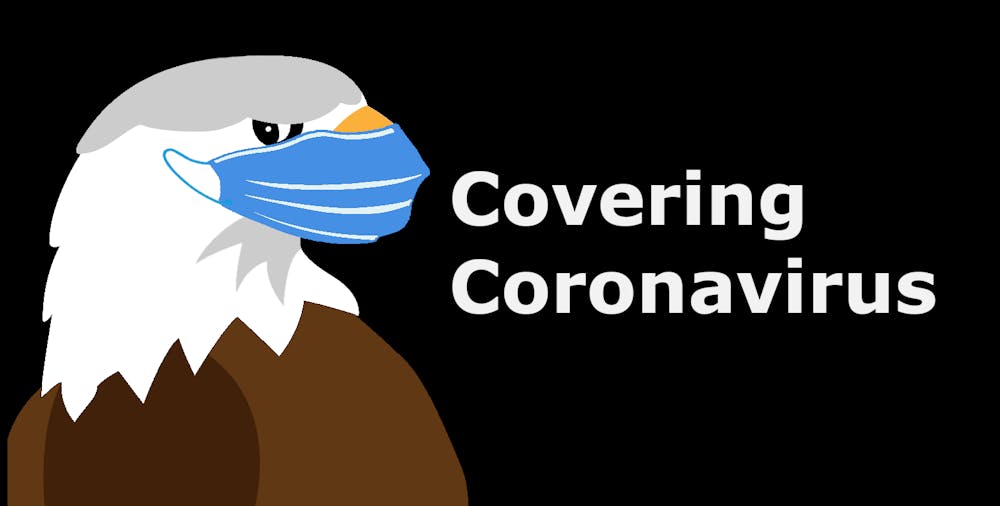Editor's Correction: This article has been updated to remove the name of the hotel to protect the privacy of the students in isolation housing.
As students returned to in-person learning this semester, American University moved its coronavirus isolation protocol from on-campus housing to a local hotel.
On-campus students who test positive for COVID-19 must isolate for 10 days in adherence with guidelines from the Centers for Disease Control and Prevention. Last semester, students stayed in an AU residence hall and relied primarily on food ordering services such as Grubhub and Uber Eats and prepared meals from the University’s dining services. This semester, students in isolation are staying at a hotel, where they are provided with room service meals.
Other schools in the D.C. area, including George Washington University and Georgetown University, have used on-campus housing for isolating students.
“Working with the hotel has allowed the University to provide a space for students that is not only comfortable, but is also the best way to make sure students have everything they need, from their own bathrooms to their own beds,” said Samia Warsame, who works as one of AU’s COVID-19 coordinators.
The hotel, which is run by the larger Hilton corporation, is still operating normally outside of a section of one floor that is being used to house AU students.
Students who have contracted COVID-19 said the University’s response has been swift and effective.
Martha Fishburne, a freshman in the School of Communication, said that the morning after getting a positive test result, she woke up to 16 missed calls from the University’s contact tracing number and found a man knocking on her door, instructing her to pack up her belongings.
Jordan Model, an SOC freshman, had a similar experience, saying that he woke up the morning after getting tested to “a million emails, and a million missed calls.” Model said he opened the Safer Community app and saw red letters on the screen indicating the positive result. He then packed up all of his necessary belongings and was then taken to the hotel for isolation.
“I was taken out of the back of my dorm building, where a man in a suit was waiting for me in this fancy black car, and he escorted me to this nice hotel where I would be treated to room service three times a day,” Model said.
Despite being a self-proclaimed picky eater, Model said he was impressed with the quality of the meals, even calling it “restaurant quality.” According to a menu obtained by The Eagle, the hotel served AU students options ranging from buttermilk chicken tenders and crab fritters to burgers to desserts like cheesecake and sorbet. While Fishburne also remembered the food fondly, she did note that there were some days where the University forgot to feed her, or forgot to send a certain meal.
“It was kind of awkward because I couldn’t get my own food,” Fishburne said. The issue was resolved when she reached out to her COVID-19 liaison, she said, who was very apologetic.
Upon receiving a positive result, each student receives a personal COVID-19 adviser who calls them every day to check on their symptoms, including their temperature and pulse oximeter.
As a COVID-19 adviser, Warsame has a myriad of responsibilities.
“I make sure students get their meals, their medications and any packages that are getting dropped off during their stay ... and make sure everyone is healthy and keeping track of their vitals.” Students also meet with doctors through telemedicine appointments where they are prescribed the appropriate medications for their symptoms.
Although students felt that their physical health was closely monitored, the University’s treatment of mental health has not seemed to be as highly prioritized.
“Being all of a sudden completely cut off from all human contact was really overwhelming. I couldn’t even go outside and the window I had in my room was facing a brick wall, so it kind of felt like I was in a prison cell at times,” Model said.
Fishburne echoed Model’s concerns about mental health, as she identifies as a “very social person” and “definitely slipped into some dark places” during her time in isolation.
“For a school that makes every student take AUx for two semesters and talks about how mental health positive they are, they really dropped the ball on the mental health aspect of COVID, which was kind of disappointing to see,” Fishburne said. She also said that she could not open her window for fresh air. Last semester, Dr. David Reitman, the Student Health Center’s medical director, told The Eagle that students were offered access to mental health professionals while in isolation on campus. Warsame also acknowledged that part of her role as a resource to affected students is to check in on their mental health as well as their physical.
In addition to dealing with the mental health implications of isolation, some students who contracted the virus also said they struggled with the social stigma surrounding COVID-19. Fishburne said she experienced this after the University sent out a mass contact tracing email to her residence hall floor.
“I don’t like the term ‘witch-hunt’ but there was a big investigation in our floor Snapchat group chat where people were like ‘who has COVID?”’ Fishburne said. “It seemed like they just wanted to know so they could just talk about it and gossip, when all they really needed to know was that they should get tested.”
Fishburne said that she felt her peers saw contracting COVID-19 as a “moral failing,” even though AU’s testing and vaccination policies are very extensive and everyone is “doing what they can.”
“I don’t think that it should be as stigmatized as it is, because that definitely keeps people from being open about it,” she said.





